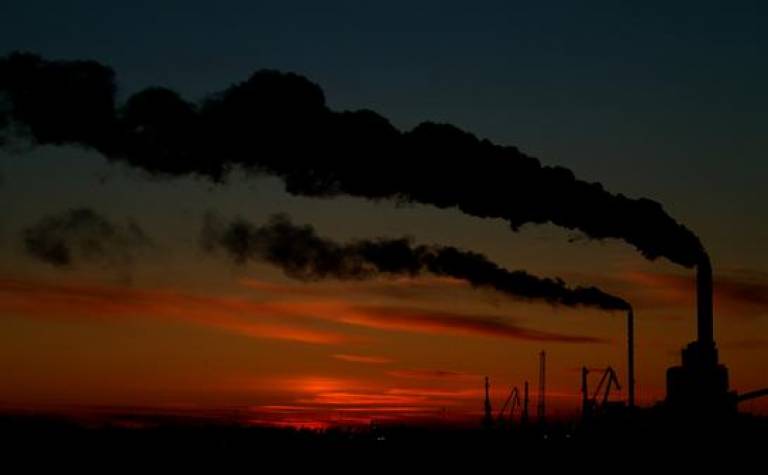A Convenient Fallacy: Assigning Responsibility in Climate Action
22 December 2014
Philippe Beck (MSc Global Governance and Ethics) on a GGI Seminar with Dr Ilan Kelman on 'Developing Global Governance for Climate Change'.

In mid-December, the preparatory climate conference in Lima ended unspectacularly having failed to produce the ground-breaking deal some might have hoped for, but hardly anyone expected. The great 'unknowns' remain: how specific and concrete will commitments made in Paris be? And will they suffice to keep global warming underneath the targeted thresholds? What is certain at this point is that the most politically contentious issues have been put on hold once again, leaving the countdown clock to Paris ticking louder than ever.If the roof of your house has been blown away by the raging winds of a typhoon or collapsed under its pouring rain, do you wait for someone to fix it? Or can you muster the resources, time and skills to repair it yourself? And how resilient is your roof anyways, and how vulnerable your construction?
This is the allegory used by Dr Ilan Kelman, affiliate at the UCL Institute for Risk and Disaster Reduction and at the UCL Institute for Global Health, to introduce an hour of lucid reflection and active debate on climate change governance. In reaction to his own allegory, Kelman made the disillusioning observation that 20 years of top-down climate governance within the framework of the UN have yielded few notable results. And Lima has proven to be more the rule than the exception to this long tradition of inadequate governance. In other words, our roof is leaking and sagging, and despite the threatening storms looming on the horizon, nobody seems ready to accept responsibility for its repair.
In addition to the significant political, technical and ethical issues, Kelman emphasised two further obstacles to effective climate governance that may not receive the attention they deserve. First, there are linguistic hurdles with regards to the very concept of 'climate'. In the English language, the concept of climate is rather straightforward and roughly refers to the general or prevailing weather conditions of a particular region. In other, local and indigenous tongues however, and on Pacific islands in particular, the very idea of long-term changes in average weather conditions is absent; the weather simply changes all the time.
Furthermore, there is an ethical question that lies at the heart of existing climate governance, namely, the extent to which global climate policy should be based on science. While the United Nations Framework Convention on Climate Change grounds its policy development in scientific knowledge, the decisions of the Intergovernmental Panel on Climate Change are subject to political bargaining, and the Panel, as suggested by its very name, answers not to the scientific community, but to national governments. Hence, all too often, compelling scientific evidence fails to trigger the policy responses required.
Drawing on his specific interest and expertise in small island states, which are, because of their size, populations and isolation, particularly exposed to the effects of climate change, Kelman then insightfully reminded the audience of the multiple and potentially very far-reaching ramifications of global warming on marine life and oceans. First, the iconic sea-level rise is only the tip of the iceberg. As a part of climate change and sea-level rise, the thermal expansion of water poses serious risks, with uncertain future effects on changing, perhaps even drifting, islands. Second, more significant than the mere occurrence of extreme weather events such as storms, floods or droughts, it is the decreasing frequency but increasing severity of these phenomena that threatens many populations. Third, the security of water and food supply is likely to become more precarious as storms, an important source of freshwater for many populations, become more cyclic. What is more, climate change may affect marine resources, as some fish species may spread at the expense of others, thus requiring people to adapt their fishing techniques. Fourth, even though the effect of ocean acidification on coral reefs and on the solidity of coral beaches is not yet fully understood, it seems plausible that coral mortality could abruptly set in once a given tipping point is reached.
This panoramic and thought-provoking reminder led Kelman to conclude that the IPCC's mantra of 'mitigation' boils down to prevention, and 'adaptation' to mitigation. On that note, and in response to an audience member's slightly provocative question about the possible need for future catastrophes to bring the climate agenda substantively forward, Ilan illustratively noted that not a single person has died from an earthquake, only from collapsing houses! Unlike unpredictable earthquakes, the fight against climate change must be seen within the context of a strategy of disaster and risk reduction (DRR), while taking into account the concepts of development and sustainability. According to Kelman, DRR encompasses all hazards, over both the short and long term, and engages societies and the environment in a dialectic relationship, whereas climate change action only deals with climate hazards in the long run, with a narrower focus of the environment's impact on societies.
As a result, the crux of the matter is that climate action can only take effect if politically translated into a graspable perspective making of each and every human a direct and responsible 'stake-holder'. A case in point would be the organisation 'Many Strong Voices', which is devoted to innovatively help local communities address the causes and consequences of climate change. In a similar vein, this reasoning suggests an enhanced bottom-up approach, not only for DRR in threatened island states - helping people to repair the roof themselves -, but also in relation to the responsibility for the broader ideas of sustainability and development lying at the root of climate action.
Although the interplay of sustainability and development, DDR and climate action may require further academic research, I would like to briefly push the ethical presumptions implied by the foregoing discussion further. Personally, I think it takes a good deal of hubris to think humans have an obligation 'to protect the environment'. Invoking such an obligation unduly disregards the fact that mankind is but a minuscule and ephemeral footnote in the history of a planet that can easily afford another billion years to produce new species and civilisations. It is us who cannot afford the costs of inaction. Thus, saving the climate and environment really means saving ourselves and future generations. And if polar bears are saved from extinction and fertile plains from desertification, that should, in my view, be 'no more' than a (more than) welcomed by-product of our self-preservation. Adopting this perspective assigns a clear and individual responsibility to every human being. Any other viewpoint risks being a convenient fallacy which obstructs concrete climate action.
The same perspective then points to questions of political discourse and framing alluded to by Kelman. If we accept the premise of 'universal individual responsibility', then a collective response is nothing but its expression mediated through political organisation from organic communities to the level of interstate relations and, ultimately, to some form of global climate governance. If climate change is the result of a sum of individual actions, the individual responsibility to ensure a safe future can be aggregated to a collective level. However, despite the tension between the irreducibility of the threats at hand and the theoretical reducibility of responsibility, international climate governance seems to be part of the problem as long as climate action is advocated for the climate's sake alone. Is it conceivable for political leadership to consistently refer to the preservation of natural resources or the protection of densely populated coastal areas, instead of bloviating at great political cost about the perils of climate change that may strike in a distant future? Governance of a more bottom-up fashion and relatable to tangible threats and dangers to constituencies may be a way forward, pushed by civil society groupings and guided by scholars like Ilan Kelman.
Nonetheless, Lima may represent a promising milestone insofar as the hampering distinction between developed and developing nations appears to have been overcome and a genuinely collective responsibility ushered in, and as the compensatory 'loss and damage' mechanism has been pushed forward as well. But are these genuine achievements towards collective responsibility and global justice, or are the risks of unmitigated climate change merely starting to outweigh the costs of mitigation in the view of some states?
Whatever the outcome of next year's conference in Paris and its impact on the future approach of climate governance, one risk will accompany us for the foreseeable future if we continue to buy into the convenient fallacy of climate action for the environment's sake: that the stable door is closed after the horse has bolted.
Links:
 Close
Close


